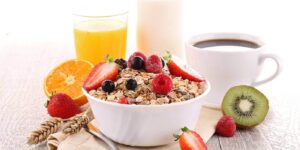Do you eat vegetables every day? If you do, then good for you because you are definitely on the right track! If you don’t, however, then this list of the top twelve healthiest vegetables in the world can inspire you to add them to your plate in every meal:
12. Zucchini
Zucchini is a go-to vegetable for those who wish to lose weight effectively. A cup of sliced zucchini contains only 19 calories, but it is so rich in fiber and nutrients, especially vitamin C and manganese, that you would never feel deprived.
11. Spring Onion
Spring onion contains allicin, a compound that helps lower total blood pressure. It also helps minimize the risk of developing coronary heart disease, stroke, and peripheral vascular diseases. In addition, it is high in vitamin B complex, iron, calcium, copper, and manganese.
10. Lady’s Finger
Lady’s finger or okra is high in vitamin C, which helps strengthen the immune system. Pregnant women are advised to consume plenty of it, because it is rich in vitamin A, vitamin B complex, folic acid, zinc, and calcium, all of which are necessary to help prevent birth defects.
9. Bell Pepper
Of the many nutrients in bell pepper, such as vitamins A, C, and E, the most unique and distinct is capsaicin. This is an active component that helps reduce pain caused by medical conditions such as arthritis and fibromyalgia.
It also shows promise in reducing the risk of certain types of cancer, especially cancer of the prostate.
8. Asparagus
Roasted asparagus is a great side dish, whether roasted, steamed, or creamed. If you are fond of this vegetable, then you would be glad to know that it is high in glutathione, an antioxidant that helps break down carcinogens in the body. It is also rich in vitamins A, C, E, and K, as well as fiber, folate, and chromium.
7. Tomatoes
Tomatoes are known for their deep red color, but did you know that the lycopene that causes their pigmentation is a powerful antioxidant? Lycopene helps prevent atherosclerosis or the hardening of the arteries and helps reduce the risk of certain types of cancer, including prostate, breast, ovarian, colon, bladder, and pancreatic cancer. Keep in mind, though, that the best way to activate this is if the tomatoes are heated.
6. Green Peas
Green peas are not only tasty and easy to prepare, but also rich in folic acid and vitamins C, K, and B complex. Together, these help strengthen your cells against infection and promote cellular repair and development. In addition, green peas contain phytosterols, which help reduce bad cholesterol levels.
5. Brussels Sprouts
Brussels sprouts are known for their high vitamin C content, so much so that even just a half-cup serving can cover 50 percent of the amount most adults need for the day. Brussels sprouts have been receiving a bad rep among kids, but they can actually be super delicious if tossed in olive oil, salt, and pepper, and then roasted nicely.
4. Broccoli
If you have a problem with high bad cholesterol levels, then you must include broccoli into your diet. This vegetable has special fiber properties that help bind with bile acids in the digestive tract, thus reducing bad cholesterol. Take note, however, that broccoli should never be eaten raw. Rather, it should be steamed so that its cholesterol-reducing effects will work.
3. Carrot
Apart from being delicious and crunchy, this root vegetable is high in vitamins C, K, and B8. It also contains potassium, iron, copper, and manganese. It is most notably high in beta-carotene, which the body converts to vitamin A that is much needed for eye health, as well as healthy skin and a strong immune system.
2. Spinach
Spinach is one great vegetable to stir into your pot or pan. That is because it is rich in antioxidants that prevent the cholesterol in your body from oxidizing. It is also rich in magnesium, which helps reduce high blood pressure. Moreover, it contains high levels of iron, calcium, magnesium, and vitamins A, C, E, and B6, among others.
1. Kale
It might sound overrated, but there is a good reason why everyone’s talking about kale. Simply put, kale has more iron than meat per serving, more calcium than milk per calorie, is rich in cancer-fighting vitamin K, and contains vitamin A for your skin, lung, and oral cavity health. To top it all off, one cup of kale contains a mere 36 calories, but it has enough fiber to detoxify your digestive system.
Of course, just because these are the top ten healthiest vegetables does not mean you should limit yourself to them. Each vegetable has its own special blend of vitamins, minerals, and other nutrients that your body needs.
Just find out how to prepare all your vegetables in the healthiest and most delicious ways so that they become a staple in your diet.




